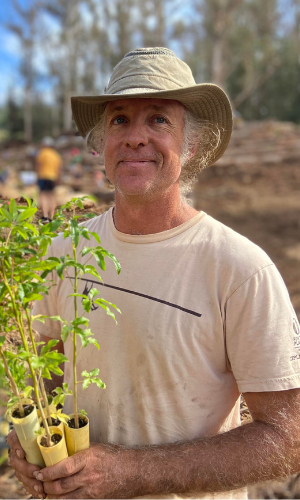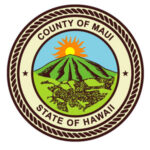Maui resident Joseph Imhoff, co-owner of Haleakalā Biochar, has a passion for land restoration. A 2022 alumnus the Ka Ipu Kukui program, co-founder of the Plant a Wish project, and a recipient of the Mālama I Ka ‘Āina Award, he also serves on the Maui County Arborist Committee. His ongoing work is focused land stewardship, tree planting, and the restoration of native habitats.

Located high on the slopes of Haleakalā, the family-run business was founded in 2020 and has been committed to making the highest quality biochar to support the health of soils, fresh water, and the ocean. They provide Maui-made biochar for agricultural producers, home gardeners, land restoration projects, stormwater filtration projects, and soil remediation. This is especially important in the aftermath of the 2023 wildfires, and Imhoff’s team now offers free biochar to fire survivors whose properties need soil remediation.
“Biochar is simply a foundation for healthy soils,” Imhoff explained. “It works by providing beneficial microorganisms, the sorts of little critters that enrich the soil, feed plants, and produce healthy ecosystems. When pre-charged with these beneficial organisms, biochar promotes plant health. We utilize dying eucalyptus and wattle trees that burnt up during the 2023 fires…With hardwood-sourced biochar made to the right specifications, we can also improve water and soil quality, increase soil fertility, and raise agricultural productivity. We basically cook it down to pure carbon. It’s 100% charcoal, and it has no contaminants in it.”
Kahoʻolawe Island Conservation and the University of Hawaiʻi contracted Haleakalā Biochar to help with planting in inaccessible areas of Kahoʻolawe as part of ongoing reforestation efforts. The program uses drones to release native seeds, sourced on Kahoʻolawe, in seed balls containing a mixture of compost and biochar to help keep the seeds viable for a longer period as they take root.
“So far, we’ve had three Native Seedball Workshops,” Imhoff said. “Each drone can take 50 loads, deploying a string of 100 seed balls with each flight. We are basically supercharging the seed balls with the most micronutrients we can. It’s like a cocoon with nutrients that will grow, become a plant, and then a tree that will help restore the island.”
Thanks to grant support from the County of Maui and MEO, we are able to scale up production and donate 3 cubic yards of biochar to qualifying fire survivors who lost homes and would like to protect their land before rebuilding.
Joseph Imhoff Co-owner, Haleakalā Biochar
